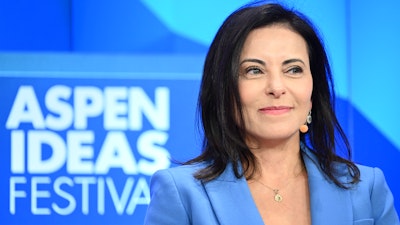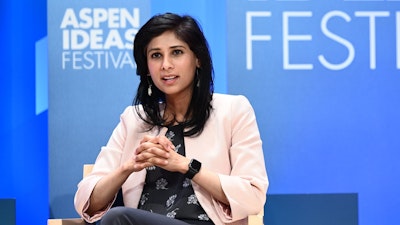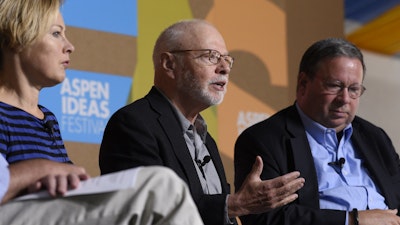Gillian Romaine Tett, OBE, is Provost of Kings College, Cambridge University in the UK and a columnist and editorial board member for the Financial Times. She previously served as FT Chair of the Editorial Board and Editor-at-large, US. She has been writing weekly columns for many years, covering a range of economic, financial, political and social issues, and co-founded FT Moral Money, a sustainability newsletter.Tett was the FT’s US managing editor from 2013 to 2019. She was named Columnist of the Year (2014), Journalist of the Year (2009), Business Journalist of the Year (2008) in British Press awards and won three American SABEW awards. She is also an award-winning and best-selling author of Anthro-Vision, A New Way to See Life and Business (2021), The Silo Effect (2015); Fool’s Gold (2009) and Saving the Sun (2003). She has a PhD in social anthropology from Cambridge University based on field work in the former Soviet Union, and has been decorated for her work promoting social science.
Previously

Academia is beset by challenges related to free speech, admission policies, donor pressures and soaring costs. University leaders are simultaneously negotiating these minefiel...

The war in Ukraine has once again highlighted the importance of international alliances, and that is certainly evident on the African continent, where the world’s superpowers...

How fast can the world really move off hydrocarbons, and are we underestimating deep macroeconomic analyses of the energy transition in our policymaking? Two financiers delve...

Over the past few years, companies have come off the sidelines regarding major policy issues from gun violence to climate change. For Levi Strauss & Co and Patagonia, advocati...

Ongoing war in Ukraine and the resulting tensions between the West, Russia, and China have made the NATO alliance all the more significant, and yet perhaps more vulnerable. Wh...

The 21st-century U.S. economy has faced significant challenges, of which the ripple effects — job loss, decreased access to credit, delayed investments, financial instability...

The world’s biggest banks and investors have pledged $150 trillion in assets to tackle climate change. But are these commitments actually getting us closer to net zero, consid...

How should business leaders reconsider their growth strategy amid a new geopolitical, inflationary, and monetary policy landscape? In particular, this discussion will include...

It is common wisdom: Inequality is terrible for democracy. What choices exist for executives seeking to invest in democracy and its institutions? The idea that business leader...

What’s the future of streaming, disinformation, and building greater trust among audiences? A conversation with César Conde, the leader of NBCU News Group, the largest news o...

The last two decades have seen revolutionary transformations in productivity, communications, and industry, generally thanks to the massive applications of technology. There i...

The recent frenzy around NFTs and cryptocurrency have thrust blockchain into the spotlight. But is the true promise of the technology more profound? Joe Lubin, co-creator of E...

In economics, debt policy can be a deeply polarizing issue. And yet, top US economists are finding that, lately, there are more innovative policy recommendations to agree on t...

Double-digit unemployment and some permanent job losses are among the long-term consequences of Covid-19. But there is one positive side of the crisis, says Hank Paulson, form...

Through the rise of European populism — from Brexit in the West to Orban in the East, from the Swedish far right in the North to the Italy's Northern League in the South — Eur...

The unique characteristics of ideas make material progress possible. But that’s not all: Ideas matter not just for what humans have, but also for how they are. During the Plei...

In 2018, economic activity was accelerating in almost all regions of the world. One year later, much has changed. The escalation of US-China trade tensions, credit tightening...

How companies are remaking the corporate landscape in spite of politics, and sometimes because of politics, in really interesting ways. A conversation with the CEOs of PayPal...

Why do some leap ahead while others fall behind in today’s chaotic, connected world? Two visionary thinkers take you on a whirlwind tour of the 21st century, revealing how "ne...

Will the boom in asset prices come to an end, and should it? How spectacular will the correction be? Will tax cuts boost the economy, leading us to better returns, or should w...

In the summer of 2018, President Trump sang praises about the country’s economic conditions, tweeting, “In many ways this is the greatest economy in the HISTORY of America.” B...

It’s been called one of the worst self-inflicted political wounds of modern times. British Prime Minister Theresa May, seeking to solidify her mandate for a hard exit from the...

What are the factors that will affect economic growth? A distinguished panel of investors and business leaders are joined by a top observer of economic issues to share perspec...

Can a transformative solution built on the conservative principles of free markets and limited government save the planet? Now that the United States is backing out of the Par...

Chinese President Xi Jinping is poised to start his second five-year term when the 19th Party Congress convenes in Beijing this fall. Under him, a new generation of leaders wi...

American women have lived their daily lives — before and after the epic election of 2016 and its accompanying drama — up against a set of structures, barriers, and mindsets th...

The White House beat is always challenging, but being in the press corps during the first few months of the Trump administration has truly been a wild ride. From the administr...

Adam Smith, the father of modern capitalism, envisioned the financial system as a helpmate to business: banks would take our savings and invest it in productive new enterprise...

Policy makers and economists have much to say about invigorating the country’s economic prospects and productivity. What might leaders of the US business community advise, wer...

In the 1930s, the Great Depression reversed a long trend towards globalization: Borders were shut, trade was halted, and tariffs imposed. After the 2008 financial crisis, it i...


